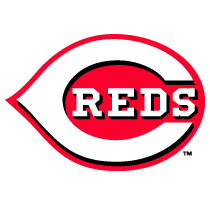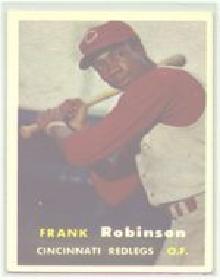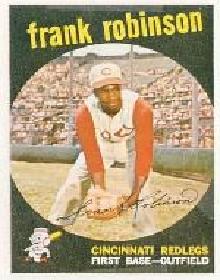






 |  |  |  |  |  |  |
 |
 |
|
During the last two years of his playing career, he served as the first permanent African-American manager in Major League history. On September 30, 2006, he was told that his contract as manager of the Washington Nationals would not be renewed.
Robinson was born in Beaumont, Texas and grew up in Oakland, California. Robinson attended McClymonds High School in Oakland where he was a basketball teammate of future NBA great Bill Russell.
Robinson had a long and successful playing career. Unusual for a star in the era before free agency, he split his best years between two teams: the Cincinnati Reds (1956 - 1965) and the Baltimore Orioles (1966 - 1971). The later years of his career were spent with the Los Angeles Dodgers (1972), California Angels (1973 - 1974) and Cleveland Indians (1974 - 1976). He is the only player to be named Most Valuable Player in both leagues, in 1961 with the Reds and again in 1966 with the Orioles.
In his rookie year, 1956, he hit a then rookie-record 38 home runs as a member of the Cincinnati Reds and was named Rookie of the Year. His best of many seasons with the Reds was 1961, when the Reds won the pennant and Robinson won his first MVP award. The Reds lost the 1961 World Series to the Yankees. Prior to the 1966 season, Reds owner Bill DeWitt made the controversial decision of sending Robinson to Baltimore in the same deal that sent ace pitcher Milt Pappas to Cincinnati. The trade tarnished Dewitt's legacy, and outrage over the deal made it difficult for Pappas to adjust to pitching in Cincinnati. (The trade has been made famous in the 1988 movie Bull Durham, where Susan Sarandon's character says, "Bad trades are a part of baseball, I mean who can forget Milt Pappas for Frank Robinson, for gosh sakes.") DeWitt famously defended the deal to skeptical Reds fans by claiming that Robinson was "an old 30." Meanwhile, Robinson's first year in Baltimore was a historic one. He accomplished the rare feat of winning the Triple Crown, leading the American League with a .316 batting average, 49 home runs and 122 runs batted in. The Orioles won the World Series, something Robinson's Reds had never accomplished, and Robinson was named the Series MVP. On June 26, 1970, Robinson hit back-to-back grand slams (in the fifth and sixth innings) in the Orioles' 12-2 victory over the Washington Senators at RFK Stadium. Coincidentally, the same runners were on base on both home runsâ€"Dave McNally on third, Don Buford on second and Paul Blair on first. Robinson's Orioles won three consecutive pennants between 1969 and 1971, and won the 1970 World Series.
His career totals include a .294 batting average, 586 home runs, 1812 runs batted in, and 2,943 hits in 2808 games played. At his retirement, his 586 career home runs were the fourth-best in history (behind only Henry Aaron, Babe Ruth, and Willie Mays), though he has since been passed by Barry Bonds and Sammy Sosa. [edit] Managing career
Frank Robinson became the first black manager of a Major League Baseball team, when he was a player-manager with Cleveland in 1975. He holds the distinction of being the first black manager in both the American and National Leagues. He managed the Cleveland Indians (1975 - 1977), San Francisco Giants (1981 - 1984), Baltimore Orioles (1988 - 1991) and Montreal Expos / Washington Nationals (2002 - 2006).
Robinson's managerial record is 1,065-1,176, a .475 winning percentage. He was awarded the American League Manager of the Year Award in 1989 for leading the Baltimore Orioles to an 87-75 record, a huge turnaround from their previous season in which they went 54-107. After spending some years in Major League Baseball as the Director of Discipline, MLB offered the former manager the chance to manage the Expos.
Robinson's style of managing is somewhat controversial. In 2005, the Montreal Gazette's Stephanie Myles reported that he had spent much time playing golf during his years in Montreal. The septuagenarian sometimes spent 16 hour days between the course and the games at night. This practice came under heightened scrutiny in the American capital. Also, some journalists have questioned his lack of use of statistics to determine pitching match-ups with his hitting line-ups. Robinson defended his style of managing by saying that he goes by his "gut feeling." In a June 2005 Sports Illustrated poll of 450 MLB players, Robinson was selected the worst manager in baseball.
In 2005, one of Robinson's Nationals players asked him, in all seriousness, if he had ever played in the majors. This was reported on Real Sports with Bryant Gumbel as an illustration of how little some current players are aware of the history of the game.
On Thursday, April 20, 2006, with the Nationals winning 10-4 against their division rival, the Philadelphia Phillies, Nats manager Frank Robinson got his 1,000th win, becoming the 53rd manager to reach that milestone[1]. He had earned his 1,000th loss two seasons earlier.
During a game against the Houston Astros on May 25, 2006, Frank Robinson was forced to pull out the Nationals catcher, Matt LeCroy, during the middle of the 7th inning. In baseball, there is an unwritten rule that managers do not remove position players in the middle of an inning. Instead, managers are supposed to discretely switch position players in between innings. However, Nationals third string catcher, Matt LeCroy, let Houston Astros baserunners steal seven bases over seven innings with two throwing errors. Although the Nationals won the game 8-5, Frank Robinson found the decision so difficult to make on a player he respected so much, he broke down crying during the post-game interviews.
On September 30, 2006, the Nationals' management declined to renew Robinson's contract for the 2007 season. [1]. On October 1, 2006 he managed his final game, a 6-2 loss to the Mets, and prior to the game addressed the fans at RFK Stadium [2]. [edit] Honors
In addition to his two Most Valuable Player awards (1961 and 1966) and his World Series Most Valuable Player award (1966), Robinson was honored in 1966 with the Hickok Belt as the top professional athlete of the year in any sport.
In 1982, Frank Robinson was inducted into the National Baseball Hall of Fame. Robinson is also a charter member of the Baltimore Orioles Hall of Fame (along with Brooks Robinson), and a member of the Cincinnati Reds Hall of Fame, being inducted into both in 1978. Both the Reds and the Orioles have retired his uniform number 20.
In 1999, he ranked Number 22 on The Sporting News list of the 100 Greatest Baseball Players, and was nominated as a finalist for the Major League Baseball All-Century Team. He received the Presidential Medal of Freedom on November 9, 2005

 |  |  |  |  |  |  |